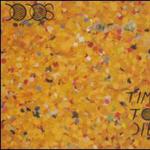
The Dodos Time To Die
(French Kiss)
This time last year, The Dodos were a band to watch. Creating pop songs shrouded in complex fretwork and primal drumming, they made acoustic guitars rock. Surrendering the urgency and hominess of last year’s Visiter, Phil Ek is brought in to produce and fill in the lo-fi spaces with some sheen. Like a waiter bringing you a fresh soda before your first is even half empty and then giving you some artificial sweetener on the side, none of it’s really necessary for this band. Sometimes holes don’t need to be filled. Oh, and the soda is flat and watered down.
Meric Long’s voice is still youthful, warm and appropriately reflective as he meanders around vague lyrics that long for profundity. Logan Kroeber’s drumming, another one of the band’s hallmark elements, has mutated into something unnoticeable as the songs slowly blend into one another. On Visiter Kroeber’s inventive rhythms were a fundamental part of the band’s sound. Here he’s simply keeping time. Still bass-less, the Dodos take on vibraphonist Keaton Snyder, an interesting addition the band should put to better use. His contributions are largely mood enhancing, rather than show stopping.
The Dodos have an interesting lineup and atypical dynamics that should be working in their favor. When so many of their jangle-pop contemporaries use acoustic guitars to stomp out run-of-the-mill folk-rock, The Dodos have always been able to stretch the limits of their instruments. But the quirks that were coaxed out at one time are ironed out flat. They’re some clever riffs towards the end of Longform and in some of the breaks of Two Medicines, but for some reason moments like these are not brought to the front of the mix. With eccentricities and edginess left latent, the content of Time to Die’s material isn’t strong enough to sustain itself.
The one truly catchy moment comes with the uplifting melody of Fables. It’s sneakily memorable, strongly autumnal and invigorating. This is one case where the songwriting overcomes the album’s general flatness. Unfortunately, the writing throughout the rest of the album doesn’t rise to this level. Tracks like The Strums take too long to take off and exhaust themselves in the process. Even the dark title of the album is something of a lark as is the innocent opener Small Deaths, which ends with a persisting, but unmemorable chant. Acorn Factory has some neat-o guitar work, but fails to leave a reason to revisit. Impressive in its scope, the album-closing title track morphs from calm to raucous rather suddenly, but lacks any kind of emotional punch. It becomes complacent in its pleasantness.
Maybe this was some kind of attempt to bring in a bigger producer, appeal to a broader audience, and get more beer commercial time (Miller Chill? Really?!) Whatever the reason, the band seems to have decided musical chops and precision production are more important than ideas, turning Time to Die into a startlingly streamlined affair that passes without leaving much of a mark.
9 October, 2009 - 14:23 — Brett Oronzio